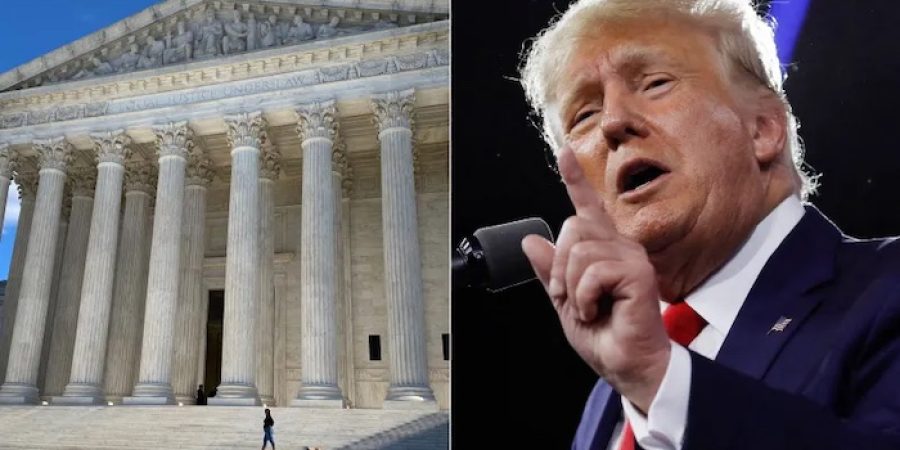The US Supreme Court has allowed President Donald Trump’s administration to resume deporting migrants to countries other than their own without offering them a chance to argue they could face harm, delivering a major victory for Trump’s hardline immigration agenda.
In a brief, unsigned order, the court lifted a lower court injunction that had required the administration to provide deportees with a “meaningful opportunity” to present claims of potential torture or harm if removed to a third country. The decision, made without explanation, drew a scathing dissent from the court’s three liberal justices.
Justice Sonia Sotomayor, writing for the dissenters, described the ruling as “a gross abuse” of the Supreme Court’s authority.
“Apparently, the court finds the idea that thousands will suffer violence in far-flung locales more palatable than the remote possibility that a district court exceeded its remedial powers when it ordered the government to provide notice and process to which the plaintiffs are constitutionally and statutorily entitled,” she wrote.
Calling the move “as incomprehensible as it is inexcusable,” Sotomayor accused the administration of “openly flouting” multiple court orders.
The policy in question allows the Trump administration to deport migrants to so-called “third countries” — nations other than the migrant’s home — even if those nations are politically unstable. The Department of Homeland Security (DHS) has argued that the policy is critical for removing migrants who have committed serious crimes, especially when their countries of origin refuse to take them back.
In its appeal to the Supreme Court, the administration claimed due process had already been satisfied and that the eight South Sudanese men targeted for removal had committed “heinous crimes” in the United States, including murder, arson and armed robbery.
“The Supreme Court’s stay of a left-wing district judge’s injunction reaffirms the president’s authority to remove criminal illegal aliens from our country and Make America Safe Again,” said White House spokesperson Abigail Jackson.
“Fire up the deportation planes,” added DHS Assistant Secretary Tricia McLaughlin.
The case stems from a class-action lawsuit brought by immigrant rights groups after the administration moved in February to accelerate deportations to third countries. The plaintiffs, representing migrants facing imminent removal, argued that the policy violated constitutional due process protections, which require the government to provide notice and an opportunity to be heard before taking adverse actions.
On 18 April, US District Judge Brian Murphy in Boston issued an injunction, stating that deporting migrants without giving them a chance to present fear-based claims “likely violates” constitutional protections. He also ruled on 21 May that the Trump administration had breached his order by attempting to deport a group of migrants to South Sudan, a country the US State Department has warned citizens to avoid “due to crime, kidnapping and armed conflict”.
Following Murphy’s intervention, the government halted the deportations and kept the group at a US military base in Djibouti. After the Supreme Court ruling, however, Murphy clarified that his specific order blocking the deportation of the eight men to South Sudan “remains in full force and effect.”
Trina Realmuto, executive director of the National Immigration Litigation Alliance, which represents the plaintiffs, said the Supreme Court’s action had “horrifying” consequences.
“It strips away critical due process protections that have been protecting our class members from torture and death,” she said.
The case is among a flurry of Trump administration policies to reach the nation’s highest court since his return to office in January. In May, the Supreme Court allowed Trump to end humanitarian programmes that had let hundreds of thousands of migrants live and work in the US temporarily. However, the justices expressed concern over the administration’s treatment of some migrants under the 1798 Alien Enemies Act — a law historically used only in wartime — questioning whether constitutional due process rights were being observed.
Justice Sotomayor also cited other instances of alleged noncompliance, including cases where migrants were reportedly sent to Guantanamo Bay and El Salvador in violation of court orders.
“This is not the first time the court closes its eyes to noncompliance, nor, I fear, will it be the last,” she wrote. “Yet each time this court rewards noncompliance with discretionary relief, it further erodes respect for courts and for the rule of law.”
The Supreme Court acted after the 1st US Circuit Court of Appeals in Boston declined to put Murphy’s injunction on hold on 16 May.
Boluwatife Enome
Follow us on:


